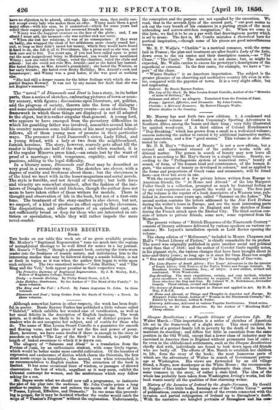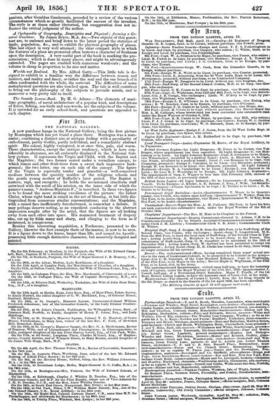PUBLICATIONS RECEIVED.
Boosts.
THE books on our table this week are of no great available promise. Mr. Morley's "Baptismal Regeneration" runs too much into the regions of metaphysical theology to be well fitted for notice in a lay journal. Mr. Geese's " Tenby," though a pleasant book, carrying the town-worn reader into the freshness of seaside nature, and introducing him to the interesting studies that may be followed during a seaside holiday, is not so fresh in topics as it was when the author first began to write upon such subjects. The two unnoticed novels—" John Halifax," and "The Ring and the Veil," both appear peculiar in their respective ways.
The Primitive Doctrine of Baptismal Itegeneration. By J. B. Motley, B.D., Fellow of Magdalen -College, Oxford.
Tenby : a Seaside Holiday. By Philip Henry Geese, A.L.S.
John Halifax, Gentleman. By the Author of" The Head of the Family." In three volumes.
The Bing and the Veil : a Novel. By James Augustus St. John. In three volumes.
Diamonds and Dust ; being Grains from the Sands of Society : a Novel. In three volumes.
.Although somewhat barren in other respects, the week has been fruit- ful in poetry. Bessie Rayner Parkes has published a little volume called "Gabriel," which exhibits her wonted ease of verification, as well as her usual felicity in the description of English landscape. The weak paints, as it etrikes us, are likely to be a want of distinct purpose for readers who do not recognize her subject, and of reality for those who do. The name of Miss Louisa Stuart Costello is a guarantee for smooth and flowing verse, and the grace if not the fire and power of poesy. Here, however, we have some doubts if there is enough in the story or anecdote on which "The Lay of the Stork" is founded, to justify the length of linked sweetness to which it is drawn out The allegory of "Salomon and Absal" is a translation from the Persian of Jams, by an enthusiastic student, with some lively vigour, which would be better under more careful cultivation. Of the beauties of expression and exuberance of diction which charm the Orientals, the first trust needs escape in translation the second, even when retrenched, is no recommendation to English readers. The attraction of the book is limited. It has some occasional lines of wisdom, or passages of shrewd observation; the best of which, ungallant as it may seem, exhibit the Oriental contempt for women, and the misfortunes which may follow asking for a son.
Mr. Bayer wrote what we should now call a programme, to insinuate the plot of his play into the audience. Mr. John Combe prints a long preface to explain the plan and enforce the merits of the first of his "Poems, Lyrics], Effective' and Dramatic." In one sense this proceed- ing is proper, for it may be doubted whether the reader would catch the scope of "Passion's Progress" without the explanation. Unfortunately, the conception and the purpose are not equalled by the execution. We read, that in the seventh lyric a the second part, "our poet imam to sob out the very breath of his existence in a parting strain of the meet unbending and sorrow-stricken resignation," &c. When we come to this lyric, we find it to be on a par with that drawingroom poetry which is set to music. The fact is, Mr. Combo mistakes a rhetorical turn for poetical inspiration,—though some of his pieces are good miscellaneous verses. Mr. R. P. Wallis's " Clotilde " is a metrical romance with the scene laid in Frame; the plan and treatment are after Scott's lady of the Lake, down even to the six cantos and their descriptive names,—as "The Chase," "The Castle." The imitation is not amiss ; but, as might be expected, Mr. Wallis carries to excess his prototype's descriptions of the superficial or external. In the first canto, for example, we have a "re- port" of the chase. "Winter Studies" is an American importation. The subject is the greater pleasure of an observing and meditative country life even in win- ter, compared with the gayeties of town. It is a very slight affair, hut not unpleasing.
Gabriel. By Bessie Rayner Parkes.
The Lay of the Stork. By Miss Louisa Stuart Costello, Author of the "Memoirs
of Anne of Brittany." Sze.
Salomon and Absal : an Allegory. Translated from the Persian of Arai.
Poems : Lyrical, Effective, and Dramatic. By John Combe.
Clotilde : a Metrical Batnance. By Robert Plampin Wallis.
Winter Studies in the Country.
Mr. Murray has sent forth two new editions. 1. A condensed and much cheaper volume of Gordon Cummings Sporting Adventures in Southern Africa among the beasts and their king ; very fully illustrated by spirited wood-cuts. 2. A third edition of Colonel Hutchinson's "Dog-Breaking," which has grown from a small to a well-sized volume; success inducing the author to extend it by additional instructive matter, canine anecdotes, and a few "good stories." This volume is also illus- trated by cuts. Mr. D. R. Hay's "Science of Beauty" is not a new edition, but a revised and condensed resume of the author's works with ad- ditional matter. The person in search of beauty may now learn all about it according to Mr. Hay's theory in a single volume. Beauty, ac- cording to the "Pythagorean system of numerical ratio," beauty of sound, of form, of the human head and countenance, of the human fi- gure, "the science of beauty as developed in colours," and as applied to the forms and proportions of Greek vases and ornaments, will be folutd here—not three but seven in one.
With the exception of a few private letters, written from Europe to American friends, the "At Home and Abroad" of the late Margaret
Fuller Ossoli is a collection, prompted as much by fraternal feeling as by any real requirement as regards the world at large. The first part of the volume is the reprint of a book descriptive of a Western tour, pub- lished in America sonic years ago, called "Summer on the Lakes." The second section contains the letters addressed to the .New York Trilmne during the writer's tours in Europe, and are the most interesting parts of the book, from the remarks on England and the sketches of Rome during the French attack upon the Eternal City. The third section con- sists of letters to private friends, some new, some reprinted from the Memoirs.
The present volume of "British Eloquence of the Nineteenth Century" consists of literary addresses delivered by -various speakers on various oc- casions; Mr. Layard's installation speech as Lord Rector opening the volume.
The cheap edition of " Melincourt," included in Messrs. Chapman and Hall's "Select Library of Fiction," is chiefly remarkable for its preface
The novel was originally published in quite another social and political world than that of 1856; and the author of Crotchet Castle rapidly notes, in his piquant style, the various changes that have been brought about in nine-and-thirty years so long ago is it since Sir Oran Haut-ton sought a "free and enlightened constituency" in the borough of One-vote.
The Lion-Hunter of South Africa : Five Years' Adventure in the far interior of South Africa ; with Notices of the Native Tribes and Savage Animals, By Ronaleyn Gordon Cumming, Esq., of Altyre. A new edition, revised and condensed. With Wood-cuts.
Dog-Breaking. The most expeditious, certain, and easy method, whether great excellence or only mediocrity be required. With odds and ends for those who love the Dog and Gun. By Colonel W. N. Hutchinson, Grenadier Guard.. Third edition, revised and enlarged.
The Science of Beauty, as developed in Nature and applied in Art. By D. B. Hay, F.R.S.E.
At Home and Abroad, or Things and Thoughts in America and Europe. By Margaret Fuller Ossoli, Author of" Woman in the Nineteenth Century," 8te. Edited by her Brother, Arthur B. Fuller.
Literary Addresses, delivered at various Popular Institutions. Third series. Melincourt. or Sir Gran Haut-ton. By the Author of "Headlong Hall." Cheap edition.
Shoepac Recollections : a Wayside Glimpse of American Life. By Walter March.—This importation is a series of sketches of American life set in the framework of a slight story. This story exhibits the struggles of a genteel family left in poverty by the death of its head, In maintain its standing ; and differs but little in essentials from the sum position in the Old World, except that a lower class of industry may be exercised in America than in England without permanent loss of caste ; for even in the oldfashioned settlements, such as the Shoepac ecollections chiefly deal with, individuals are found to look down upon old friends who are badly off. The efforts of Mrs. March to establish her childreu in life, form the story of the book ; the most humorous parts of which are the adventures of Walter in search of Government patron- age at Washington. His views are forwarded by an old Tillage friend, a Negro, now doorkeeper at the White House; the recommenda- tory letter of his member being more diplomatic than clear. There is some romance in the story, of rather a stale kind. The idea of the whole has probably been taken from Washington Irving's works, but the book wants nearly all the qualities of that charming writer.
History of the Invasion of Ireland by the Anglo-Normans. By Gerald H. Supple.—This little book, forming one of the "Celtic Union" series of publications' contains a good account of the events connected with the invasion and partial subjugation of Ireland up to Strongbow's death. With the narrative are mingled portraits of Strongbow and his, caw panions, after Geraldus Cambrensis, preceded by a review of the various circumstances which so greatly facilitated the success of the invaders. The style is at times rather rhetorical, but exaggeration does not in- fluence the critical judgment of the author.
A Cyclopedia of Geography, _Descriptive and Physical; forming a Ge- neral Gazetteer. By James Bryce, MA. &o—Two objects of this gazet- teer are, to embrace and bring down to the latest penod the statistics of trade, population, 8ce., and to exhibit the physical geography of places. This last object is very well attained ; the clear compact style in which the features of a place are presented often bestows a character of freshness upon the description. A very useful part of the book is marking the pro- nunciation; which is done in many places, and might be advantageously extended. The pages are studded with numerous wood-cuts ; and the volume is cheap in proportion to its size and matter.
Worlds not Realized. By Mrs. Alfred Gatty.—This little tale is de- signed to exhibit in a fon-oilier way the difference between reason and instinct, and reality and fancy, or rather the real and the one branch of it often confounded with the whole, the material. The difficulties of some metaphysical questions are also touched upon. The tale is well contrived to bring out the philosophy of the subjects to juvenile minds, and is moreover a very pretty tale in itself.
The Seaside Lesson-Book. By H. G. Adams.—The elements of mari- time geography, of naval architecture of a popular kind, and descriptions of fishes, fishing, sea-birds and sea-weeds, are the subjects of the volume. It is intended for an early school-book, and questions are appended to each chapter.



























 Previous page
Previous page